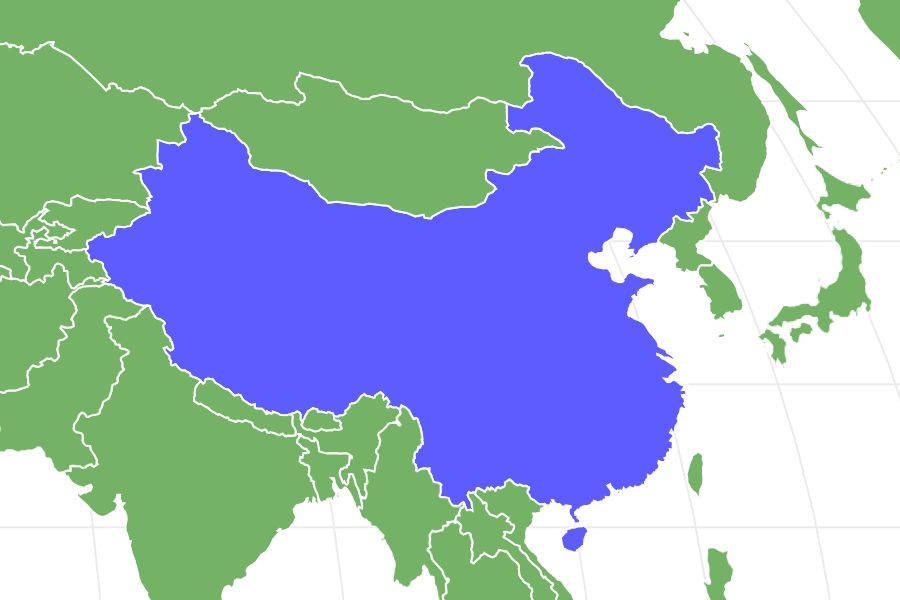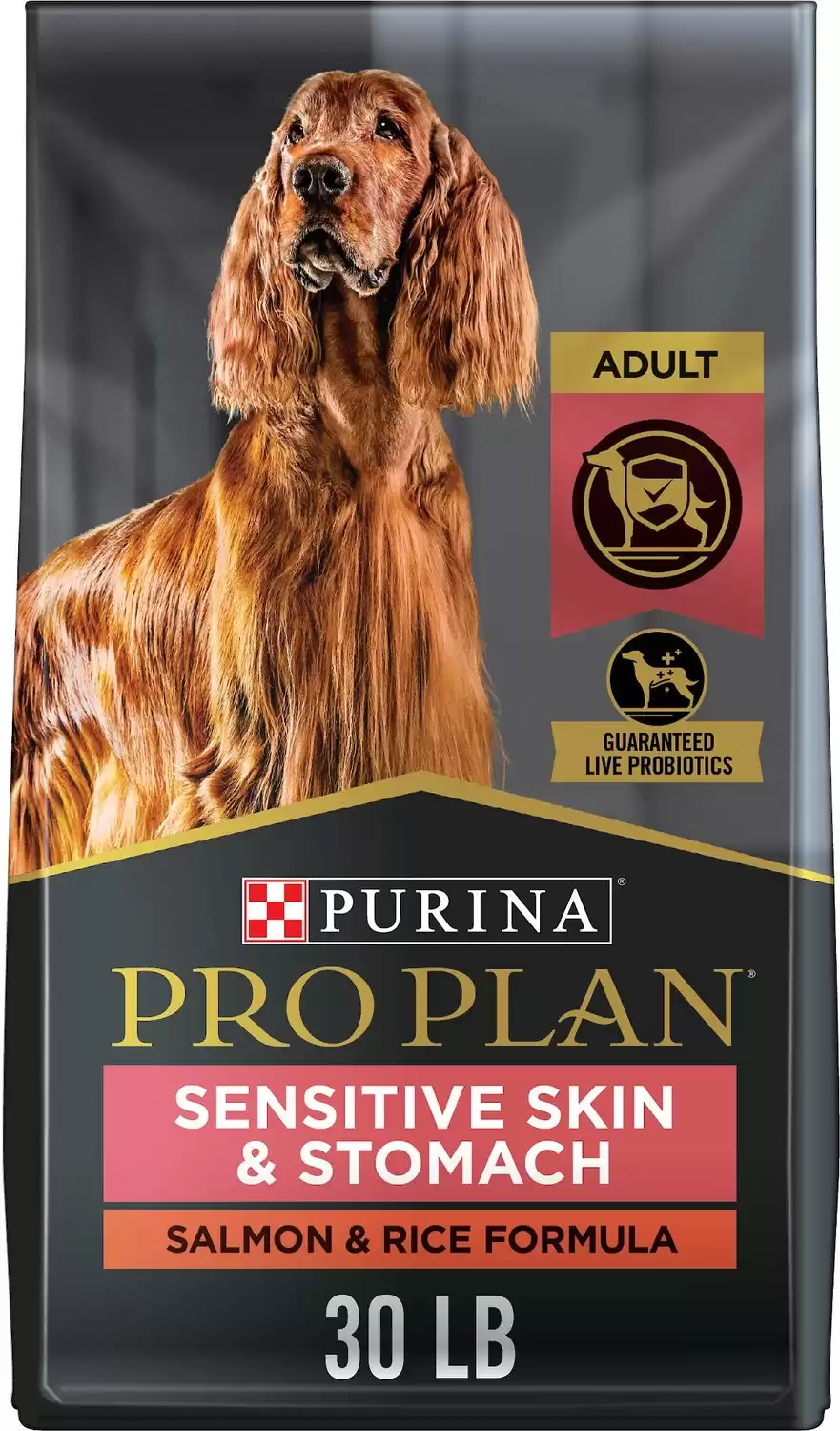Chow Chow
Canis lupus
The Chow Chow's lineage is hundred of years old.
Advertisement
Chow Chow Scientific Classification
- Kingdom
- Animalia
- Phylum
- Chordata
- Class
- Mammalia
- Order
- Carnivora
- Family
- Canidae
- Genus
- Canis
- Scientific Name
- Canis lupus
Read our Complete Guide to Classification of Animals.
Chow Chow Conservation Status
Chow Chow Facts
- Fun Fact
- The Chow Chow's lineage is hundred of years old.
- Most Distinctive Feature
- The adult Cho Chow have a blue tongue
- Temperament
- Not sociable or outgoing, sometimes aggressive, and often suspicious of strangers
- Diet
- Omnivore
Chow Chow as a Pet:
- General Health
- Energy Level
- Shedability
- Trainability
- Intelligence
- Tendency to Chew
- Size
- Family and kid friendliness
- Yappiness / Barking
- High
- Separation Anxiety
- Low
- Preferred Temperature
- Average climate
- Exercise Needs
- Low
- Friendly With Other Dogs
- Poor
- Pure bred cost to own
- $900
- Dog group
- Non-sporting
- Male weight
- 45-70 lbs
- Female weight
- 43-60 lbs
This post may contain affiliate links to our partners like Chewy, Amazon, and others. Purchasing through these helps us further the A-Z Animals mission to educate about the world's species.
View all of the Chow Chow images!
Chow Chows are a dignified, all-purpose dog of ancient China.
The Chow Chow, with its teddy bear face, lion’s mane, and extra fluffy coat, presents itself with the dignified bearing of a dog comfortable among royalty. It may seem aloof, but this sturdy, muscular breed is loyal to its family and possesses many attributes.
See all of our expert product reviews.
Chow Chows are known to be as fastidious as cats and are among the cleanest of canines. They are so clean that they are a breeze to house train – maybe the easiest of all dogs! Chow Chows have a double coat that comes in different colors like red, blue, black, cream, and fawn. Adults have blue or black tongues.
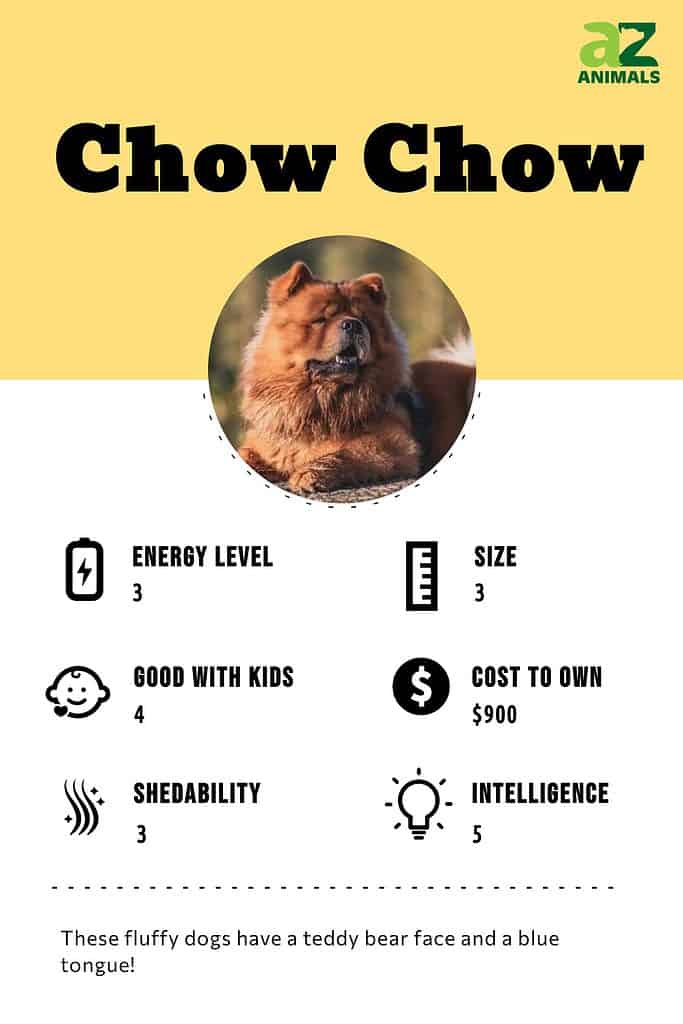
Evolution
Chow Chows are depicted on artifacts from China’s Han Dynasty, around 206 b.c., but many believe them to be the progenitors of spitz-type dogs that would make them an even more ancient breed. They were popular companions to Chinese nobles – so desirable that one Emperor is said to have owned thousands of the regal canines. Through the years the Chow Chow has had its ups and downs – from being a pampered royal companion to working as a guard dog to even providing nourishment for their starving countrymen when food was scarce.
During the 1820s the dogs were actually exhibited at the London Zoo as “Wild Dogs of China.” Their luck changed for the better when they caught the eye of Queen Victoria, who adopted a Chow Chow and made the breed popular.
3 Pros and Cons of Owning a Chow Chow
| Pros! | Cons! |
|---|---|
| Good watchdogs: Despite their tiny size and classification, these dogs make great watchdogs and are acutely aware of their surroundings. | Aggressive: These dogs can display aggressive behaviors sometimes and can get overly suspicious of strangers. |
| Calm and confident: If you are looking for a stern breed, this might be the perfect choice for you. | Decision-makers: These dogs have minds of their own. Therefore, any interference in their decisions could lead to troublesome behaviors. |
| Mannerly at home: These dogs do not create a lot of fuss at home, so they won’t turn your home into absolute chaos. | Grooming: They need regular grooming so if you are not looking for a high-maintenance animal, this might not be a good choice for you. |
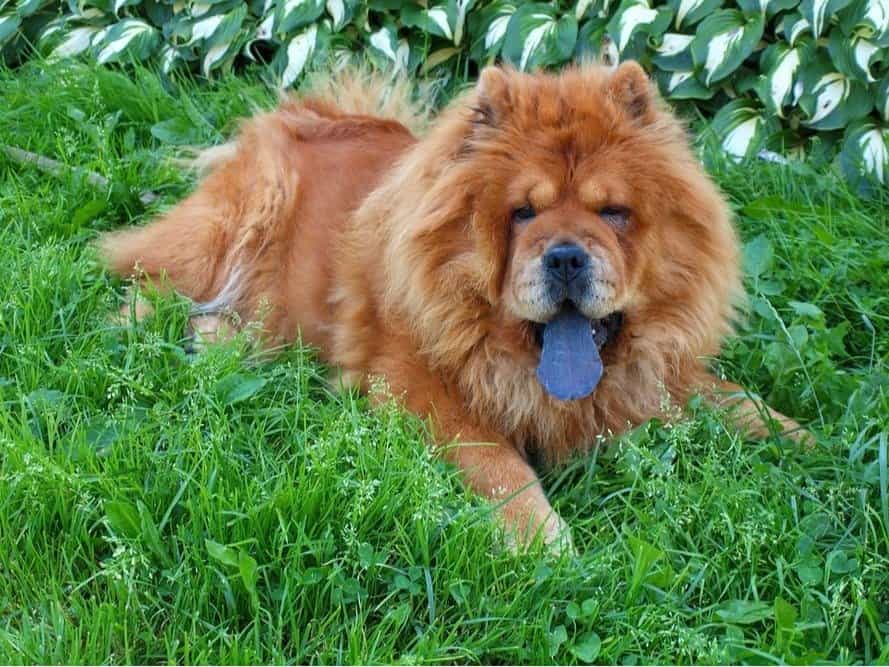
Chow Chows are sturdy underneath their fluffy coats and sport blue or black tongues as adults.
©Bokstaz/Shutterstock.com
Health and Entertainment for your Chow Chow
See all of our expert product reviews.
Size and Weight
With a UKC classification as a “non-sporting” breed, these dogs have a relatively small size. Don’t let the fluffy fur fool you – they are just as firm and sturdy as they are small. While males are about 17 to 20 inches, females call somewhere in the middle at 18 inches. Males are heavier than females at 45 to 70 lbs. Females, however, only reach a maximum size of 44 to 60 lbs. at their adult size.
| Height (Male) | 17-20” tall |
| Height (Female) | 18” tall |
| Weight (male) | 45-70 lbs., fully grown |
| Weight (female) | 44-60 lbs., fully grown |
Common Health Issues
Like every other dog, the Chow Chows (scientific name: Canis lupus familiaris) has its own set of problems that are consistent with small dogs. One of the biggest issues that this dog breed faces is both hip and elbow dysplasia. This condition is a congenital issue for the breed and simply means that the joints of the elbows and hips are not properly aligned.
Cruciate ligament disease is another issue among these dogs. The joint of the knee becomes unstable, leading to twisting and slipping at the joint, which is incredibly painful. This dog will show their pain by walking on only three of their four legs, limping carefully.
There is a bloating condition called gastric dilation volvulus that is common amongst these dogs as well. Gastric dilation volvulus can be fatal, and it mostly impacts dogs with a deep chest (which is typical of them). As the stomach bloats, some cases never make any progression. However, the bloating can cause it to twist.
Entropion is another eye-related disease that these dogs suffer from. Also common in English bulldogs, it is caused by the eyelid rolling towards the inside of the eye, leading the hairs along the eyelid to rub against the cornea and cause severe pain.
Therefore, the health problems that these dogs suffer from are:
- Hip Dysplasia
- Elbow Dysplasia
- Cruciate ligament disease
- Gastric dilation volvulus
- Entropion
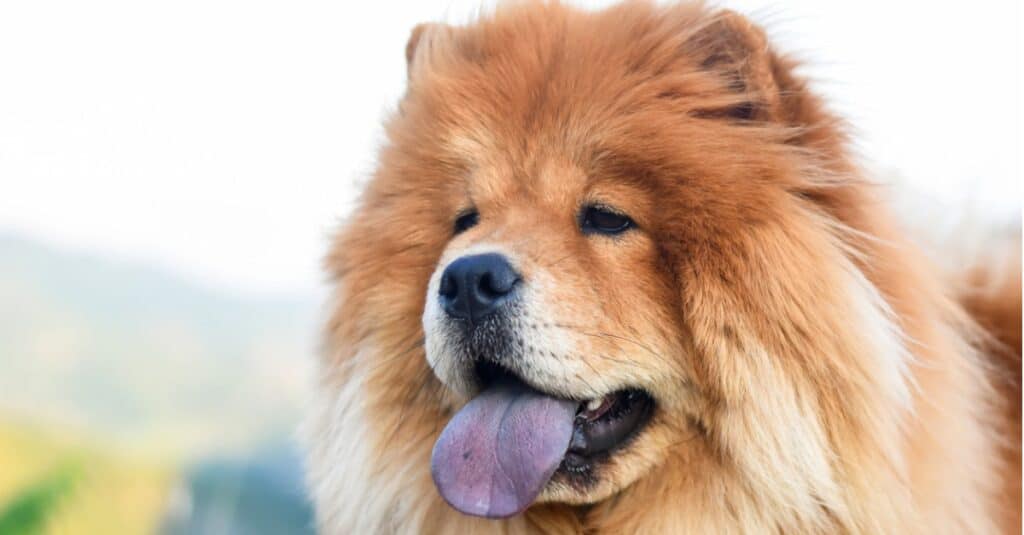
Chows are not very sociable and are serious-minded and suspicious.
©iStock.com/Ivan Marjanovic
Temperament
Whether a purebred or a mix, these dogs are not known to be very social dogs and are also not very outgoing. Their temperament is such that they can get very suspicious of strangers and can often get very aggressive with other dogs.
For them to be comfortable around other dogs, they must be introduced to socializing concepts very early on in life. Though this disposition is what makes them protective watchdogs, families with other pets may need to put in extra work to train them to be civil.
They can also often cause chaos with their alarm barking which needs to be controlled. These dogs are intelligent but are also high-headed and stubborn. They need a patient and stern owner and trainer. They are known to be very protective of their own families and can often turn dominant if not taught their position in the families. They can sometimes be obedient in the right direction.
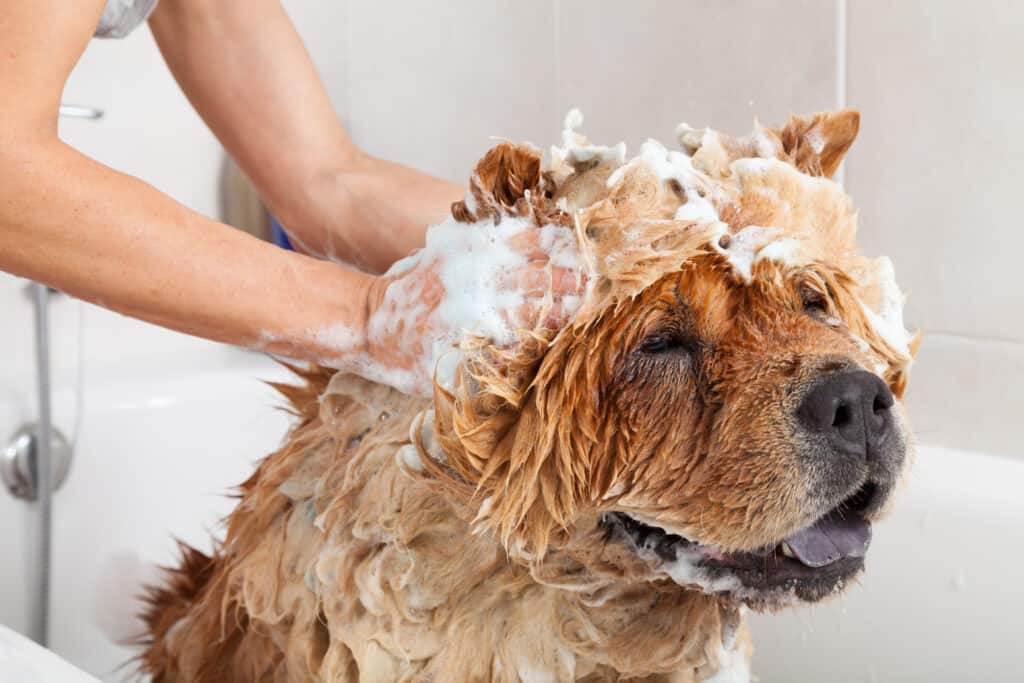
Chow chows should be bathed every six weeks.
©iStock.com/fotoedu
How to Take Care of a Chow Chow
Owning a Chow Chow can take a lot of work in grooming, but their diets are fairly easy to keep up with. Here are a few things that you need to keep in mind about taking care of your dog.
The Best Dog Food for Chow Chows
These dogs need to eat a diet full of grains and vegetables. You could occasionally supplement their diets with fish and soy. However, you need to go easy with the levels of proteins in their diets as high protein levels could lead to skin problems in these dogs. Still, they love a mix of dry foods and wet foods alike, so the only concern is that their food has minimal grains, since the breed may have allergies to these foods.
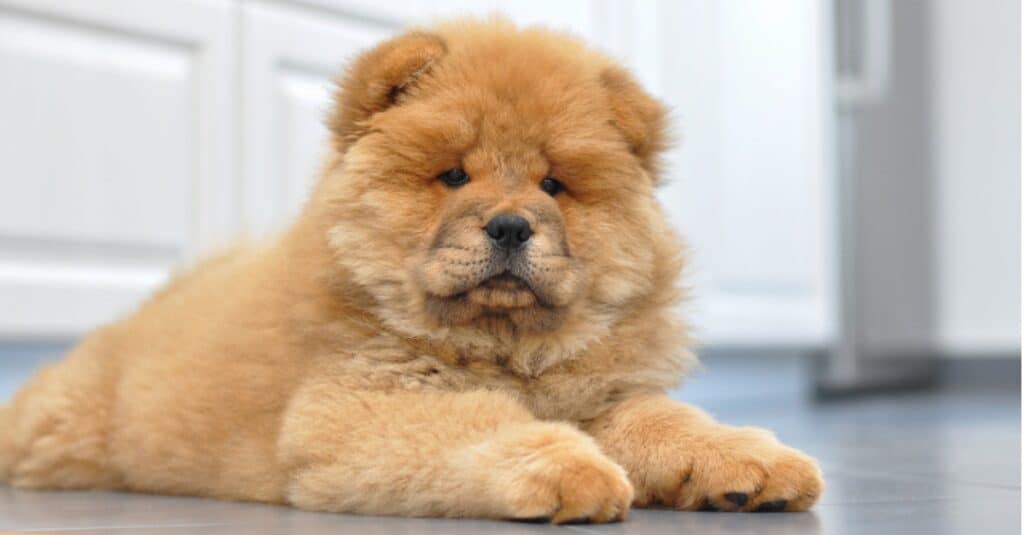
Chow Chow puppies need several small meals a day.
©iStock.com/Ivan Marjanovic
The puppies need to be given the same diet. However, you will have to feed the pups in smaller quantities at shorter intervals as their small stomachs are usually not able to digest too much food at once.
As a dog that’s susceptible to gastric dilation/bloat, use caution while feeding your Chow Chow, and always monitor feeding to ensure small enough portion sizes. Perhaps you’ll want to look for a sensitive stomach dog food that’s easy for Chow Chows to digest.
An excellent option for Chow Chows is Purina Pro Plan Large Breed Sensitive Skin & Stomach with Probiotics.
Not only does this protein-rich dog food offer EPA, omegas, and glucosamine to protect a Chow Chow’s joints, but it also contains probiotics for smoother digestion. This dog food uses salmon as a healthy source of high-quality protein that will keep Chow Chows full and reduce overeating.
Check Chewy or Amazon for this product.
- Salmon and rice recipe for sensitive stomachs and and skin
- Live probiotics for optimum digestive health
- Sunflower oil promotes healthy skin and coat
Maintenance and Grooming
These dogs are known to be fairly high maintenance and need brushing every day. Their coats need very regular brushing. They have a double coat, and it may take quite a while to remove the hair that they shed. Luckily, most groomers are quite caring and gentle with the breed.
They can be bathed every week – but should definitely get baths every six weeks, minimum.
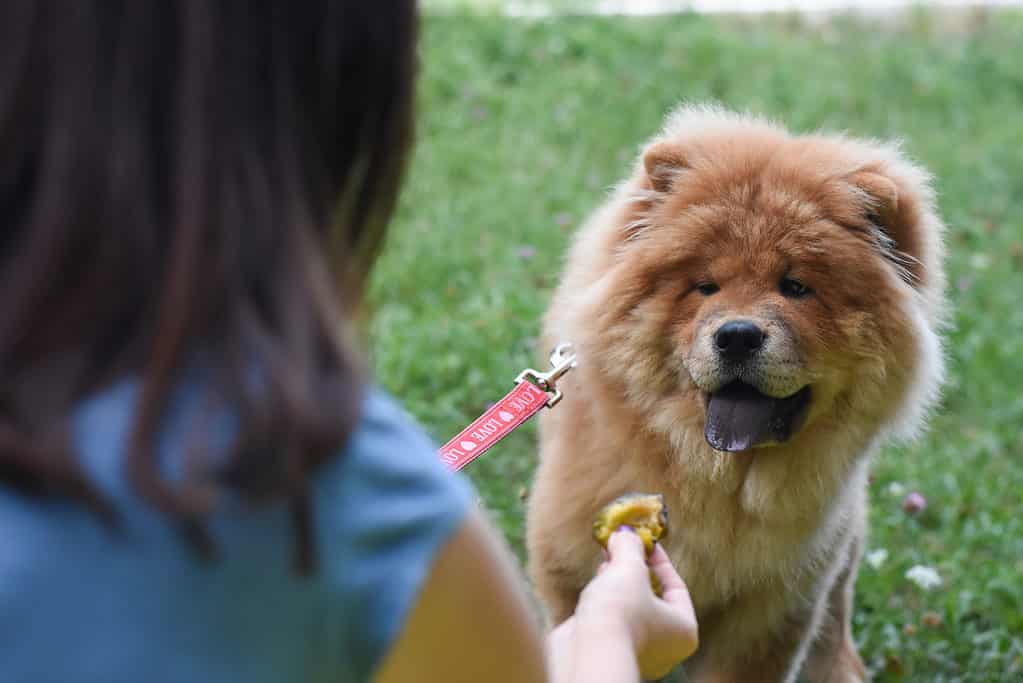
Chow chows are very independent – making them a challenge to train.
©iStock.com/Ivan Marjanovic
Training
Training these dogs is not an easy job, regardless of the mix of breeds. They have hunting traits and can often be aggressive and predatory towards other pets and animals in general, and these inclinations are hard to rid them of.
They are also very independent and are high-headed, which means that these dogs cannot be forced into anything at all. They would either completely shut down or show retaliating behavior if you try to train them under harsh conditions or with punishments. The best training techniques will need to involve encouragement with positive reinforcement.
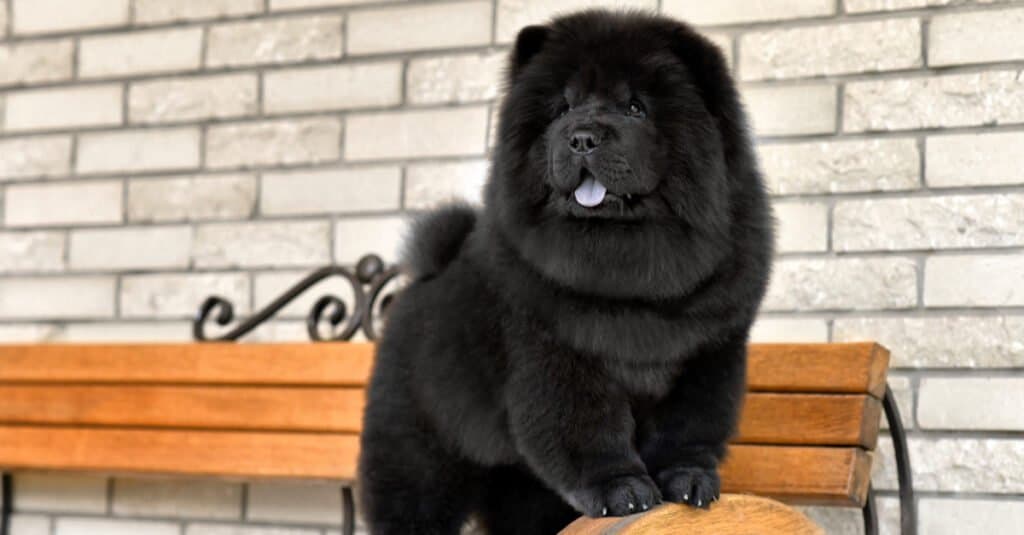
Chow Chows don’t need a lot of exercise.
©Natalia Fesiun/Shutterstock.com
Exercise
Every canine needs to have regular exercise to support a healthy weight and to regulate the release of mood-balancing hormones. This movement prevents them from becoming restless. However, they don’t like to be out too much – just a couple of walks a day might be everything that they need.
Their bodies are meant to be thicker, and most pups are ready to go inside within about 15 minutes. If you can get them to stay out a little longer, it is possible to get away with one walk that lasts a little longer each day.
Puppies
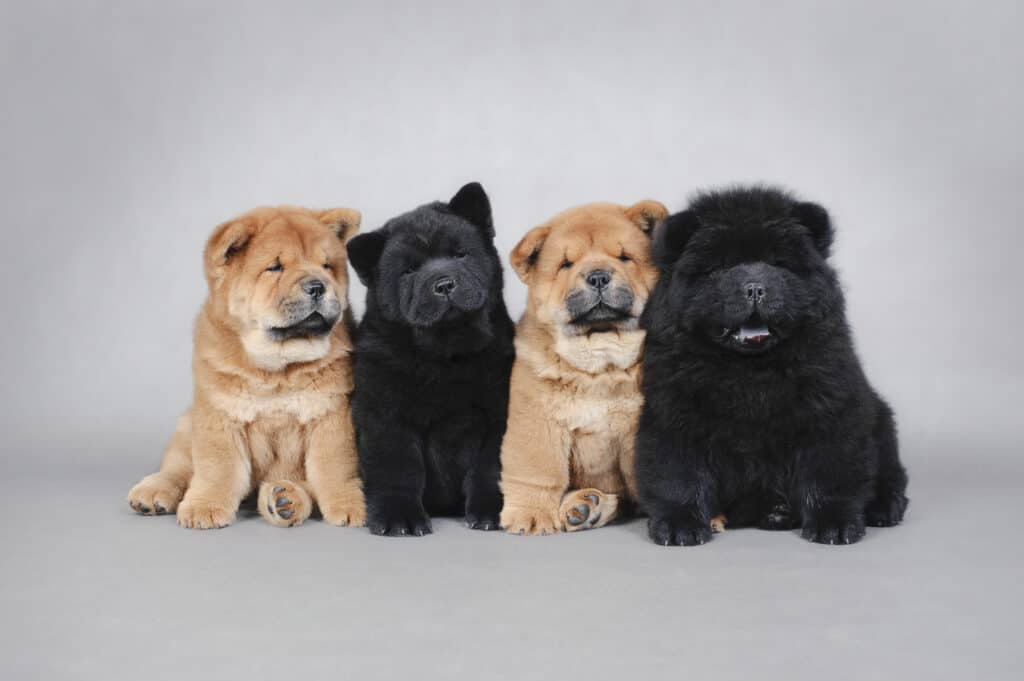
Chow Chow pups need to be socialized with people and other dogs.
©iStock.com/foto-front
The Chow Chow puppy has a double coat early on, so intensive grooming will be necessary after they are a few weeks old. They will need to be trained to socialize very early on in life so that they become sociable adults. Puppies will need to be fed in small amounts after shorter intervals because their small stomachs cannot digest a lot of food at once. These frequent meals will likely last until the puppy reaches a year old.
Children and Chow Chows
If these dogs are taught how to be around children, they would be great with them. However, they are not very patient around children and would not take abuse from young children. They are great with families with children who know how to treat these dogs with respect.
For families that want to adopt one of these dogs, be sure to have a conversation with the children in the household about proper behavior to avoid any unfortunate accidents.
Dogs Similar to Chow Chows
As beautiful and sassy as a Chow Chow might be, this dog isn’t the right pet for every person. Here are some alternative breeds that may suit potential owners well.
- Tibetan Mastiff: Much like the Chow Chow, Tibetan Mastiffs are also aggressive and headstrong. They are much larger than a Chow Chow in weight, but only a little taller.
- Alaskan Malamute: Alaskan Malamutes are intelligent and are also highly social, making them great pets for families that often interact with other people. They are incredible watchdogs but need much more space than an apartment to thrive.
- Keeshond: Keeshonds are known to be very loyal and friendly towards their owners and have a highly affectionate nature. However, they are much more friendly to strangers, so they may not be the right watchdog for someone.
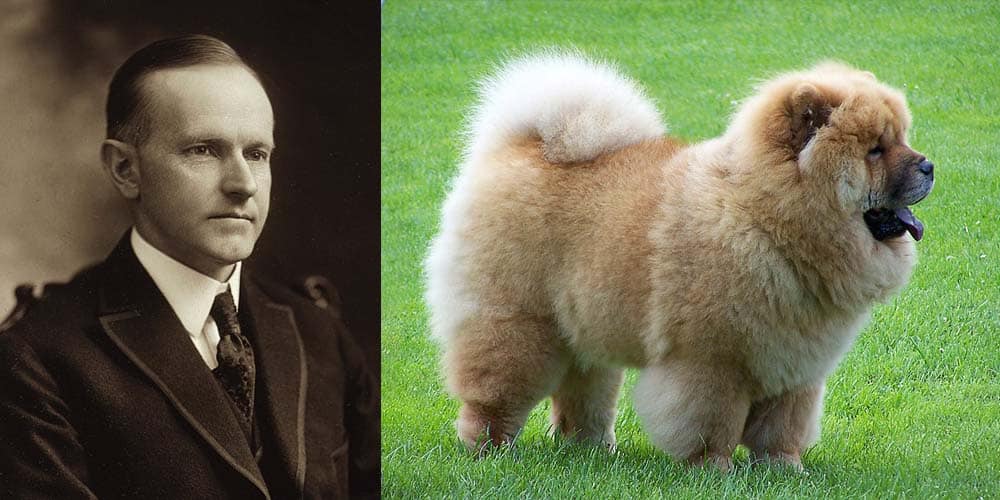
Famous Chow Chows
Several celebrities own these dogs. Some of them include Martha Stewart, President Calvin Coolidge, Elvis Presley, and his girlfriend Linda Thompson. Famous psychoanalyst Sigmund Freud also owned one of them.
Popular Names of Chow Chows
Some of the popular names for Chow Chows are:
- Lucky
- Chance
- Daisy
- Sparky
- Bow-Wow
Chow Chow FAQs (Frequently Asked Questions)
How much does a Chow Chow cost to own?
These dogs usually cost about $900. Additional costs can come up to $700 to $1000 per year.
Is a Chow Chow good with kids?
If trained properly, the Chow Chow can be great with kids. However, they are not very patient around the children of the family – especially very young children.
How long does a Chow Chow live?
The lifespan of Chow Chows is usually 9 to 15 years.
Are Chow Chows aggressive?
Chow Chows can sometimes present aggressive behaviors towards other pets and animals in general.
Are Chow Chows good family dogs?
If trained how to live with the family, they can be great family pets.
What colors are Chow Chows?
They come in a variety of colors including black, fawn, cream, red and blue.
Are Chow Chows herbivores, carnivores, or omnivores?
Chow Chows are Omnivores, meaning they eat both plants and other animals.
What Kingdom do Chow Chows belong to?
Chow Chows belong to the Kingdom Animalia.
What class do Chow Chows belong to?
Chow Chows belong to the class Mammalia.
What phylum to Chow Chows belong to?
Chow Chows belong to the phylum Chordata.
What family do Chow Chows belong to?
Chow Chows belong to the family Canidae.
What order do Chow Chows belong to?
Chow Chows belong to the order Carnivora.
What genus do Chow Chows belong to?
Chow Chows belong to the genus Canis.
What type of covering do Chow Chows have?
Chow Chows are covered in Hair.
What is an interesting fact about Chow Chows?
Chow Chows are loyal and affectionate to their families!
What is the scientific name for the Chow Chow?
The scientific name for the Chow Chow is Canis lupus.
What are the key differences between the Samoyed and Chow Chow?
The key differences between the Samoyed and Chow Chow are appearance, lifespan, temperament, energy levels, trainability, barking levels, and health.
Thank you for reading! Have some feedback for us? Contact the AZ Animals editorial team.
Sources
- Wikipedia, Available here: https://en.wikipedia.org/wiki/Chow_Chow
- Mental Floss, Available here: https://www.mentalfloss.com/article/74605/11-fluffy-facts-about-chow-chows
- Cuteness, Available here: https://www.cuteness.com/article/diet-chow-chow
- Dogtime, Available here: https://dogtime.com/dog-breeds/chow-chow#/slide/1
- Your Pure Bred Puppy, Available here: https://www.yourpurebredpuppy.com/reviews/chowchows.html
- Hill's Pet, Available here: https://www.hillspet.com/dog-care/dog-breeds/chow-chow
- PDSA, Available here: https://www.pdsa.org.uk/taking-care-of-your-pet/looking-after-your-pet/puppies-dogs/medium-dogs/chow-chow#contents-link-1
- American Kennel Club, Available here: https://www.akc.org/dog-breeds/chow-chow/

